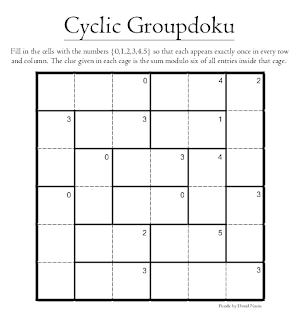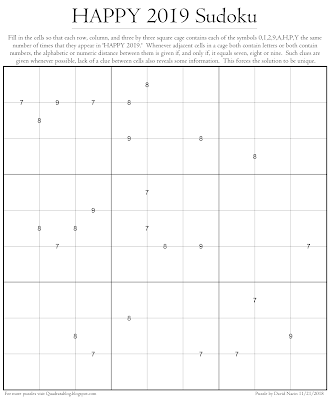Cyclic Groupdoku
This next puzzle involves the cyclic group of the integers modulo six under addition. Place the numbers {0,1,2,3,4,5} into the cells to form a Latin square as you would in Sudoku and KenKen, but the clues here in each cage represent the sum of all entries in that cage. The summing takes place in the group, hence the name Groupdoku.
Without any group theory, one can still tackle the puzzle by knowing that the clues simply represent the remainder when the sum of the entries is divided by six. If one wants even less math, but still wants to try the puzzle for some reason, they can use the fact that the largest possible sum, given our representatives and cage sizes, is 12. Thus a clue of 0 means the sum is 6 or 12, a clue of 1 means the sum is 7, a clue of 2 would mean the sum is 8, a clue of 3 would mean the sum is 3 or 9,and so on.
Link to high quality PDF.
Groupdoku puzzles can be easily constructed over any finite group, as associativity is never an issue. For non-abelian groups there are a number of ways to handle things. Perhaps easiest is to assign an order for the products in each cage, though that doesn't come into play here since addition modulo six is commutative. I'm choosing to post this modulo six puzzle first since it's both short and easy, but there will be more challenging groupdoku to come.
Without any group theory, one can still tackle the puzzle by knowing that the clues simply represent the remainder when the sum of the entries is divided by six. If one wants even less math, but still wants to try the puzzle for some reason, they can use the fact that the largest possible sum, given our representatives and cage sizes, is 12. Thus a clue of 0 means the sum is 6 or 12, a clue of 1 means the sum is 7, a clue of 2 would mean the sum is 8, a clue of 3 would mean the sum is 3 or 9,and so on.
Groupdoku puzzles can be easily constructed over any finite group, as associativity is never an issue. For non-abelian groups there are a number of ways to handle things. Perhaps easiest is to assign an order for the products in each cage, though that doesn't come into play here since addition modulo six is commutative. I'm choosing to post this modulo six puzzle first since it's both short and easy, but there will be more challenging groupdoku to come.



Comments
Post a Comment